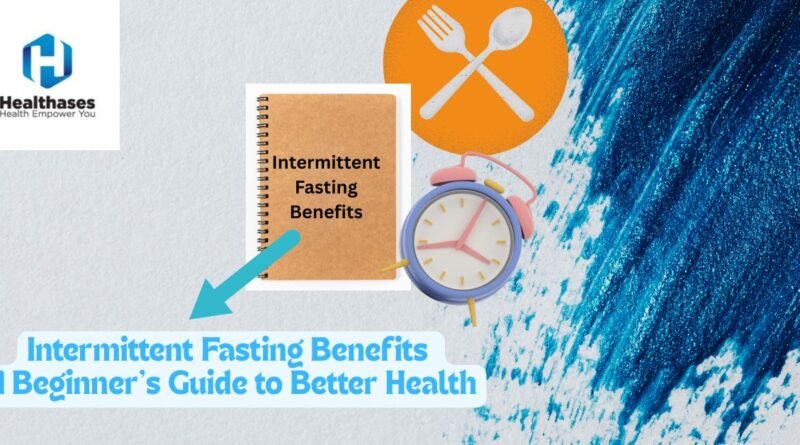Intermittent Fasting Benefit Guide for Beginners
Intermittent Fasting Benefit Guide for Beginners
Intermittent fasting (IF) is one of the most popular health regimens currently circulating the globe and for good reason. Whether you’re trying to lose weight, improve metabolism, or you’d just prefer to simplify your life, understanding the intermittent fasting benefit can be the first step toward sustainable health change.
This guide breaks down the science, health, and wellness benefits, potential fasting schedules, and safe ways to get started in a way that is easy for beginners to follow. Let’s delve into the science behind the effectiveness of intermittent fasting benefits health and explore how it can work for you.
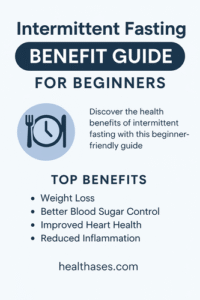
🕐 What Is Intermittent Fasting?
Intermittent fasting is not a diet. Instead, it is a time-based eating pattern that promotes a cyclical eating schedule between fasting and eating. Realistically, it is not about what food to eat, but rather when to eat.
There are many types of intermittent fasting schedules, but the most popular is the 16/8 fasting schedule, which involves fasting for 16 hours and eating during an 8-hour window. Other popular methods of intermittent fasting are the 5:2 method (where you eat normally for 5 days of the week and restrict caloric intake on 2 days) and 24-hour fasts on two days of the week.
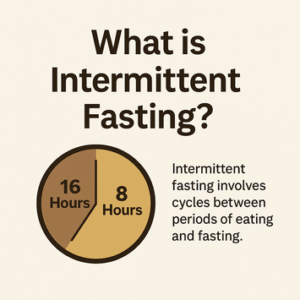
Intermittent fasting is ancient but has resurfaced as a modern trend for health, and research on its benefits continues to strengthen. Throughout history and across cultures, people have used fasting for religious, spiritual, and health purposes.
Read our other blog on “72 Hours Water Fasting: Benefits and Drawbacks”.
⏱️ Common Ways to Get the Benefits of Intermittent Fasting
There is no definitive way to implement IF, but here are some examples and common ways for beginners to start:
🔹 The 16/8 Method
Also referred to as Leangains, 16 hours of fasting and eating during an 8-hour window. This is usually the most sustainable and commonly adopted.
Some 16/8 fasting benefits include proper insulin regulation, fat burning, and better digestion.
🔹 The 5:2 Diet
The 5:2 diet is where you eat normally for 5 days of the week and restrict your intake of calories (500-600 calories) for 2 days of the week. This is more flexible when compared to the other methods, but still provides considerable benefits of intermittent fasting.
🔹 Eat-Stop-Eat
Eat-stop-eat is a 24-hour fast once or twice a week. This is more advanced and not meant for beginners.
🔹 Alternate Day Fasting
This method is where you either eat every other day, or there are modified versions of fasting where you take in 500 calories on your fasting days. Some users find it quite difficult, but you may experience your strongest metabolic results with this method.
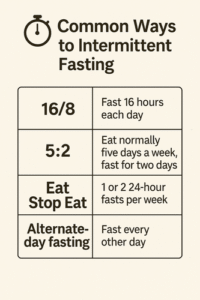
⚙️ How Intermittent Fasting Works: Cellular and Hormonal Changes
When you fast, you are changing a lot on a cellular and hormonal level. These systems are the reason why intermittent fasting 16/8 implements health benefits:
- Increased Human Growth Hormone (HGH): Helps burn fat and gain muscle.
- Lower Insulin Levels: Improving insulin sensitivity helps fat be released from stores to be burned.
- Cellular repair processes – When fasting stimulates autophagy, to groups down damaged parts of cells.
- Improved gene expression: Regarding longevity and disease resistance.
These processes also contribute to the advantages of implementing IF as a really positive wellness tool, not just for losing weight but for optimizing health.
✅ Top Science-Backed Benefits of Intermittent Fasting
There are so many benefits of intermittent fasting that are backed by science:
🔸 Weight Loss & Fat Loss
The foremost benefit of intermittent fasting is naturally reducing calories. By limiting your eating window, you will usually eat less (without feeling deprived). IF will also slightly increase your metabolism in the short term.
🔸 Better Blood Sugar Control.
IF will improve insulin sensitivity, which will reduce your risk of developing type 2 diabetes. This is a huge benefit, especially for those with prediabetes or insulin resistance.
🔸 Improved Heart Health.
Research has shown that intermittent fasting benefit blood pressure, cholesterol, and triglycerides, which are important markers of cardiovascular health.
🔸 Reduced Inflammation.
Reduced markers of inflammation have been reported in studies with people who have implemented fasting routines. They were, therefore, less likely to suffer from chronic illnesses.
🔸 Enhanced Brain Function.
Fasting increases levels of brain-derived neurotrophic factor (BDNF). This can assist with learning and memory, and in animal models, fasting also has been shown to increase nerve growth and protect against neurodegeneration.
🔸 Supports Longevity.
Animal studies have suggested that IF may help to support longevity and reduce age-related illnesses by regulating hormonal balance and supporting cellular repair.
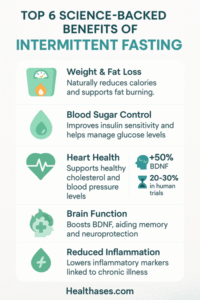
👩⚕️ Intermittent Fasting for Women: What You Should Know
Intermittent fasting (IF) has maintained popularity for many people, but its effects on women may differ due to the impact on hormonal balance.
Some women experience disruptions in their monthly cycle after implementing strict fasting routines. Research shows that the negative impact of under-consuming calories can result in infertility and/or decreased hormone production.
While IF has the possibility of offering supportive influence on hormone health for complications such as PCOS, it is suggested that women:
- Start with a more gentle fasting approach, such as 12/12 or 14/10
- Develop awareness and monitor changes in menstruation
- Do not consider fasting during pregnancy or while breastfeeding
- Consult a physician if uncertain and before beginning a fasting routine
⚠️ Who Should Not Use Intermittent Fasting?
In general, intermittent fasting is a great tool to have in your health tool belt; it is not for everyone. If you fall into any of the below categories, talk to your doctor before practicing to get intermittent fasting benefit:
- Diabetes or blood sugar concerns
- Underweight
- Low blood pressure
- History of eating disorders
- Pregnant, breastfeeding, or trying to conceive
- On medications that affect insulin or metabolism
🔄 Intermittent Fasting Calculator: How to Plan Your Day
Using an intermittent fasting calculator can help you find the best fasted and eating windows according to your schedule, objectives, and wake/sleep patterns.
- Supposing that you are fasting on a 16/8 schedule, your day might look like:
- Fasting window: 8:00 PM to 12:00 PM (next day)
- Eating window: 12:00 PM to 8:00 PM
- Stick to it. Monitor how your body reacts and adjust as necessary.
❓ Frequently Asked Questions
Can I drink water, tea, or coffee when I’m fasting?
Absolutely! Water, black coffee, and herbal teas are highly recommended to stay hydrated and perhaps suppress hunger.
Is it safe to work out while fasting?
Yes, but ease into it. You may find fasted workouts easier at first. Resistance training and adequate protein will help keep muscle.
Will I lose muscle while fasting?
You can expect some muscle loss as you lose weight. Still, fasting tends to help retain more lean mass compared to traditional calorie restriction if combined with activity and adequate protein intake.
Can I take supplements during fasting?
Certainly! However, ideally, you want to take fat-soluble vitamins with meals. Be cautious when taking anything.
👤 About the Author
Ansa Waris Hussain is a digital health writer with over 6 years of experience in SEO content creation, specializing in wellness, nutrition, and preventative care. With a passion for simplifying complex health topics and making them actionable, Ansa contributes to Healthases.com to help readers make informed lifestyle decisions.
“I believe that accessible, evidence-based health advice should be available to everyone. Intermittent fasting is one such tool—simple, natural, and powerful when approached wisely.”
Reviewed by: MBBS Doctors – Clinical Nutrition Specialists
📅 Last reviewed: June 21, 2025
🚀 Getting Started with Intermittent Fasting
Are you new to IF? Here is how to get started:
- Start with 12/12 or 14/10 fasting.
- Use an intermittent fasting calculator to determine your schedule.
- Stay hydrated and listen to your body.
- Try not to binge during the eating windows—focus on whole, nutrient-dense foods.
- Be consistent. Track your results and see how things are going.
For most beginners, the most sustainable approach will typically be the 16/8 fasting schedule.
A thing that will upset your stomach when you are fasting.
🧠 Final Thoughts: Is Intermittent Fasting the Right Choice for You?
Intermittent fasting is not a cure-all—when practiced safely and consistently, it can be an effective wellness strategy. Combine it with mindful eating, sufficient sleep, and movement to realize some of the intermittent fasting 16/8 benefits evidenced by Health practitioners.
At Healthases.com, we encourage individuals who want to practice intermittent fasting to ease into the practice with awareness and to find the style of intermittent fasting that works for their body and lifestyle.
If you are ready to dive into intermittent fasting, please save this guide and return to it regularly for meal ideas, and turbocharge your intermittent fasting with our calculators and other resource tools!

